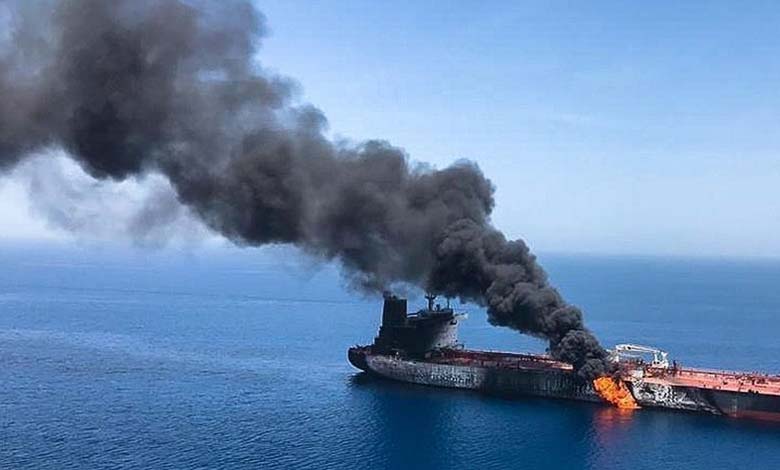A serious environmental disaster threatens the Red Sea due to Houthi attacks
An oil spill measuring 18 miles in length has appeared in the Red Sea following an attack by the Iran-backed group on the British vessel Amélie Robimar

The US Central Command “CENTCOM” announced Saturday morning an oil leak from a British ship attacked by the Houthis early last week.
CENTCOM stated in a release via the “X” platform, “On February 18 (Sunday), Houthi terrorists supported by Iran attacked the British ship Amélie Robimar, which belongs to the United Kingdom and was carrying 41,000 tons of fertilizer, leading to a slow water infiltration inside.”
They added, “The unjustified and reckless attack by Houthi terrorists caused severe damage to the ship, resulting in the emergence of an 18-mile oil slick.”
They warned that “this (leakage) could lead to a spill into the Red Sea, exacerbating this environmental catastrophe.”
The Houthis were accused of “continuing to show disregard for the regional impact of their indiscriminate attacks and the threat they pose to fishing, coastal communities, and food supplies.” Houthi military spokesman Yahya Saree said in a statement the day after the attack that the Houthis had targeted the ship in the Gulf of Aden Sunday and it is now at risk of sinking.
The Houthi group threatened Friday to completely close the Bab el-Mandeb Strait, one of the most important waterways in the world, serving as a maritime passage for international trade, through which most of the trade between Asia and Europe passes, along with about 10% of global maritime traffic.
These threats come after US statements accusing the Houthis of targeting humanitarian aid ships, referring to their attack, last Monday, February 19, on the “Champion” ship flying the Greek flag, coming from Argentina to the port of Aden with 40,000 tons of grain to unload.
US forces shot down three combat drones near commercial ships in the Red Sea on Friday and destroyed seven anti-ship cruise missiles positioned on land, after striking four drones prepared for launch in Yemen, according to the US military.
Since November 19, Houthis backed by Iran have been carrying out attacks on merchant ships in the Red Sea and the Gulf of Aden, suspected of being linked to Israel or heading to its ports, declaring it to be in support of Gaza, which has been in conflict between Hamas and Israel since October 7.
The US Central Command (CENTCOM) said in a statement on a social network that US forces succeeded early Friday in “shooting down three Houthi combat drones near several commercial ships operating in the Red Sea. No damage was caused to the ships.”
In a later statement, the US Central Command said US forces had destroyed “seven mobile Houthi anti-ship cruise missiles supported by Iran, prepared for launch towards the Red Sea.”
It added that these strikes took place between 12:30 p.m. and 7:15 p.m. local time in Sanaa, and were carried out in self-defense.
It noted that “CENTCOM had spotted these missiles in areas controlled by the Houthis in Yemen and determined they represented an imminent threat to commercial ships and US naval vessels in the region.”
CENTCOM had stated that US forces struck Thursday four Houthi drones and two anti-ship cruise missiles, clarifying that the weapons “were prepared for launch towards the Red Sea from areas controlled by the Houthis in Yemen.”
In an attempt to deter them, US and British forces have been conducting strikes on Houthi-affiliated sites since January 12. The US military alone occasionally conducts strikes it says target sites or missiles and drones ready for launch.
Following Western strikes, the Houthis began targeting US and British ships in the region, considering the interests of both countries now to be “legitimate targets.”
The Middle East is in turmoil due to the destructive campaign by Israel in Gaza in response to an unprecedented attack by Hamas on Israeli territory on October 7, fueling violence and leading to attacks by Iran-backed groups in Lebanon, Iraq, and Syria.












